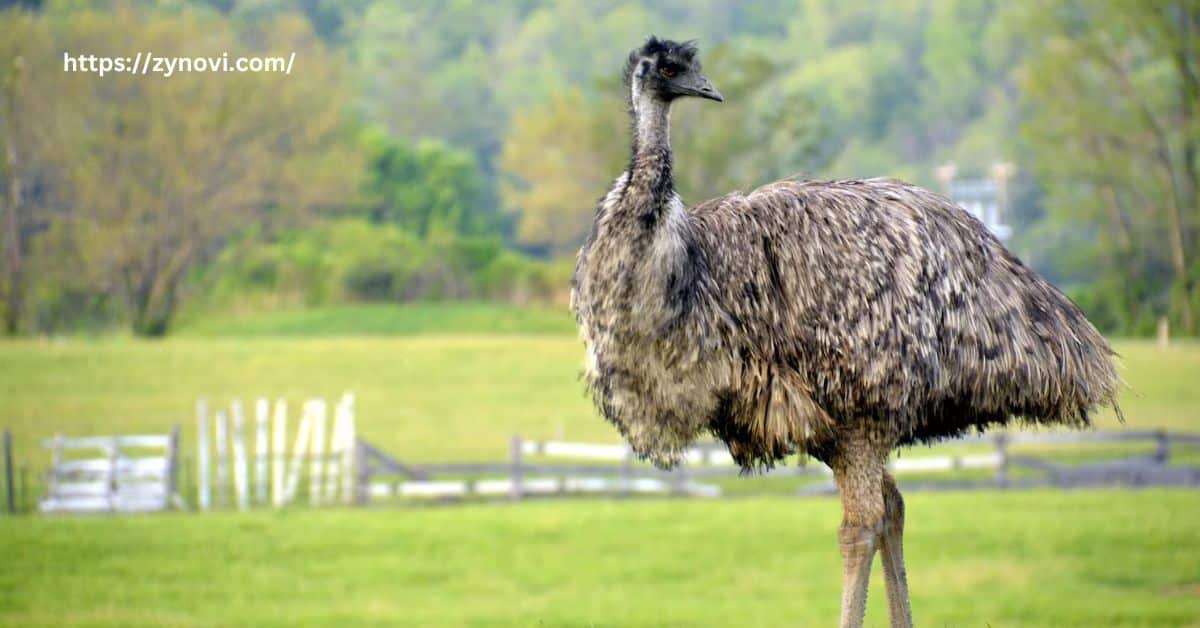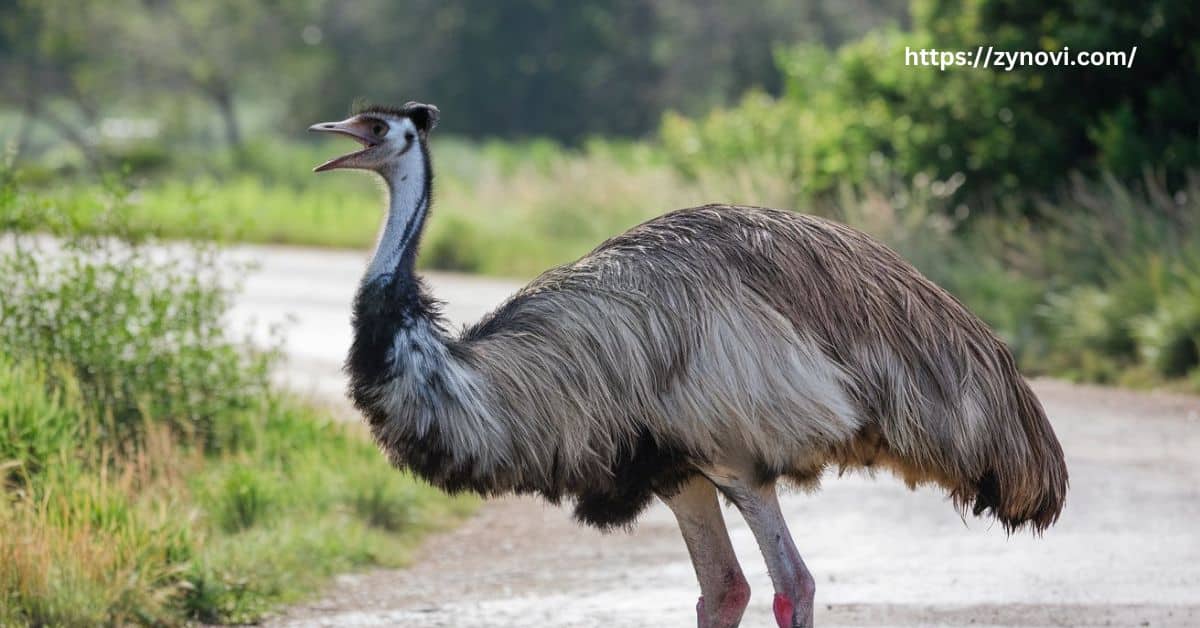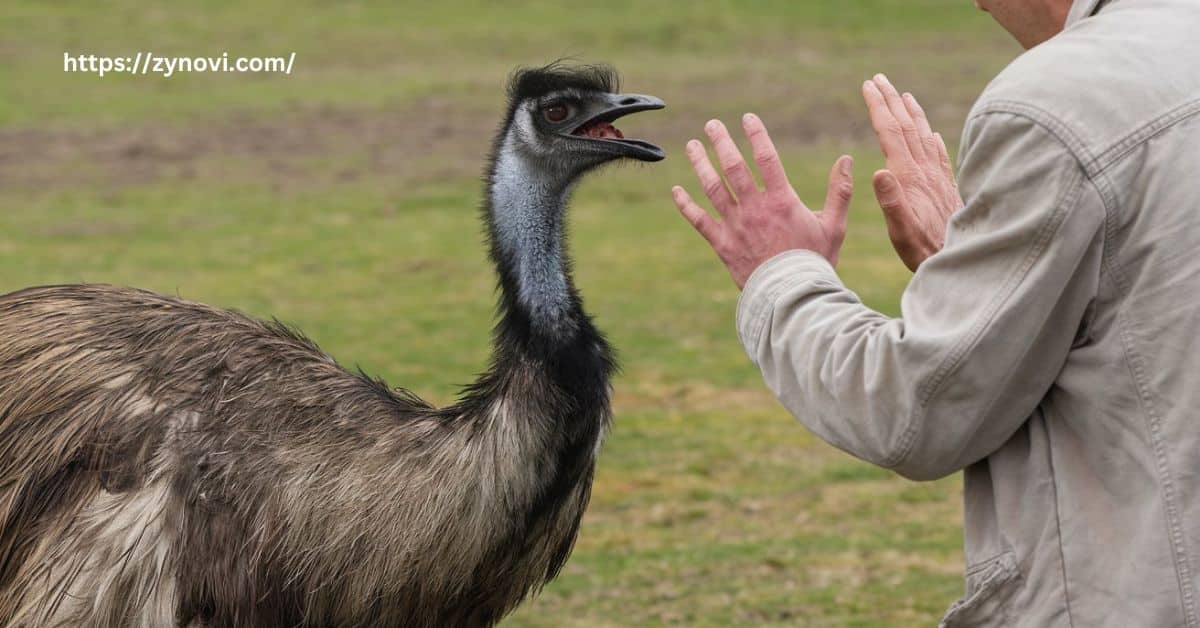Do Emus Attack Humans? Yes, emus can attack humans, but such incidents are rare and usually occur when they feel threatened or provoked.
If you’ve ever wondered about these towering, flightless birds, you’re not alone. Emus may seem harmless with their fluffy feathers and quirky behavior, but what happens when they feel threatened? Are they capable of aggression toward humans?
In this article, we’ll find out the world of emus, exploring their behavior, the rare instances when they attack, and what you can do to stay safe. Whether you’re planning a wildlife park visit or just curious, keep reading because you might be surprised by what we uncover!
What Are Emus?
Emus are the second-largest birds in the world, its a fascinating and iconic flightless bird native to Australia, is known for its towering height, unique behaviors, and occasional interactions with humans.
| Feature | Details |
|---|---|
| Height | Up to 6 feet tall |
| Weight | 70–120 pounds |
| Flightless | Cannot fly |
| Legs | Long legs enable sprinting at speeds of up to 30 miles per hour |
| Plumage | Shaggy, brown feathers provide excellent camouflage in natural habitats |
Where Do Emus Live?

Emus are highly adaptable birds that thrive in various environments across Australia. Their habitats include:
- Grasslands: These open areas provide abundant food sources like grasses, seeds, and insects, making them ideal for emus.
- Woodlands: With a mix of trees and open spaces, woodlands offer shelter and nesting spots for emus.
- Coastal Regions: Emus are often found near coastal areas, taking advantage of the diverse plant life and freshwater availability.
- Semi-Arid Deserts: These harsh landscapes support emus due to their ability to survive on minimal water and forage for sparse vegetation.
Their nomadic behavior allows them to move in response to seasonal changes, ensuring access to food, water, and suitable nesting sites throughout the year.
Behavior and Diet
Understanding emu behavior is key to comprehending why they may sometimes exhibit aggressive behavior toward humans.
Daily Behavior and Temperament
Emus are generally non-aggressive and shy, preferring to avoid confrontation. They are curious by nature, often approaching humans out of interest rather than hostility. However, their flight-or-fight response can trigger aggression if they feel threatened or cornered.
What Do Emus Eat?
Emus are omnivorous birds with a varied diet that includes:
- Plants: They consume grasses, shoots, and leaves, which form a significant part of their diet.
- Seeds and Fruits: Emus play a vital role in seed dispersion by eating fruits and spreading seeds.
- Insects and Small Animals: Their diet also includes caterpillars, beetles, and occasionally small reptiles like lizards, providing protein.
Their opportunistic feeding habits play a crucial role in maintaining Australia’s ecological balance.
Do Emus Attack Humans?

Do Emus Attack Humans? While emu attacks on humans are rare, they do occur. These birds typically attack when they feel provoked, threatened, or during their breeding season.
Emus Aggression Types
Instances of emu aggression are typically situational and include:
- Defending Nests or Offspring: Emus become highly protective during the nesting season, often displaying aggression to safeguard their eggs or chicks.
- Perceiving Threats: When humans or animals are perceived as threats, emus may respond with defensive behavior to ensure their safety.
- Provocation in Wildlife Parks: In controlled environments like wildlife parks or tourist areas, emus may show aggression if provoked by direct interaction or feeding.
Reasons for Aggression
Emu aggression is typically triggered by specific situations, such as:
- Protecting Offspring During the Nesting Season: Emus, especially males, exhibit heightened aggression to safeguard their eggs and chicks.
- Feeling Cornered or Unable to Escape: When emus sense they are trapped, their flight-or-fight response may lead to defensive aggression.
- Reacting to Sudden Movements or Loud Noises: Sudden actions or loud sounds can startle emus, prompting them to lash out in self-defense.
Nature of Emu Attacks
Emus use their strong legs and other physical traits to defend themselves during attacks:
- Kicks: Emus deliver forceful kicks aimed at the legs, abdomen, or chest, using their long, muscular legs to inflict significant impact.
- Pecking: With sharp beaks, emus may strike quickly at perceived threats, often as a warning or distraction.
- Claws: The sharp claws on their feet can cause deep lacerations, making them a formidable defense against predators or perceived dangers.
Are Emu Attacks Dangerous?
Though emu attacks are uncommon, they can be serious due to the bird’s physical power and defense mechanisms:
- Lacerations from sharp claws: Emus possess sharp claws on their feet, which can tear through skin, causing deep and painful cuts that may require medical attention.
- Bruising or fractures caused by strong kicks: Their powerful legs can deliver kicks strong enough to bruise muscles or even fracture bones, especially if the target is the abdomen, chest, or legs.
- Psychological effects, such as fear of future wildlife encounters: Experiencing an attack can lead to long-term anxiety or fear of engaging with wildlife, especially for those who frequently encounter emus in their natural habitat.
Comparison with Other Birds
Compared to other large flightless birds:
| Bird | Aggressiveness | Danger Level |
|---|---|---|
| Emu | Low to Moderate | Rarely fatal; injuries may include cuts or bruises from kicks or claws. |
| Ostrich | High | Strong kicks can cause severe injuries or potentially be fatal in extreme cases. |
| Cassowary | Very High | Known for frequent attacks; sharp claws and powerful strikes make them highly dangerous. |
How to Stay Safe Around Emus

Ensuring safety during human-emu interaction involves understanding their natural instincts and respecting their space.
Preventative Measures
- Maintain a safe distance of at least 30 feet: Keeping a reasonable distance reduces the risk of provoking an emu, ensuring your safety and theirs.
- Avoid feeding wild animals: Feeding disrupts their natural foraging behavior, potentially making them more aggressive or reliant on humans.
- Recognize warning signs: Look for behaviors like hissing, feather puffing, or raised wings, which indicate that the emu feels threatened or defensive.
What to Do During an Encounter
- Stay calm and avoid sudden movements or loud noises: Panicking or making abrupt actions can escalate the situation, increasing the likelihood of aggression from the emu.
- Slowly back away without turning your back: Maintaining eye contact while retreating allows you to keep track of the emu’s movements and ensures you don’t appear as a threat.
- If an emu becomes aggressive, use objects like bags or sticks to create a barrier: Defending yourself with a non-threatening object can provide a physical barrier, giving you a chance to safely distance yourself from the bird.
Best Practices in Controlled Environments
- Follow all posted guidelines: Wildlife parks and reserves have specific rules to ensure both visitor and animal safety. Always adhere to these instructions to minimize the risk of provoking emus or other wildlife.
- Avoid direct interaction or attempts to pet emus: While it may be tempting to get close to emus in controlled environments, it’s essential to remember they are still wild animals. Direct interaction can lead to stress or aggression, so always observe from a safe distance.
- Report any aggressive behavior to park authorities: If you witness an emu displaying aggressive behavior, inform park staff immediately. They are trained to handle such situations and can take steps to prevent further incidents, ensuring a safe environment for everyone.
Final Verdicts
Emus are typically shy and non-aggressive, but they can act defensively and attack if they feel threatened or are guarding their offspring. Most incidents arise when humans inadvertently provoke emus by getting too close or attempting to feed them.
To ensure a safe experience, it’s crucial to respect their space, understand their behavior, and avoid direct interaction. This approach allows you to appreciate these fascinating birds without risk.
FAQs
Are emus aggressive to humans?
Emus are generally not aggressive, but they can become defensive if they feel threatened or cornered, especially during breeding season.
What is the most aggressive bird in the world?
The cassowary is considered the most aggressive bird, known for its frequent attacks and powerful, dangerous strikes.
What to do if an emu approaches you?
Stay calm, avoid sudden movements, and slowly back away to maintain a safe distance.
Are emus friendly to people?
Emus are typically curious and not hostile, but they should be observed from a distance to avoid provoking them.
Conclusion: Do Emus Attack Humans?
While emus are generally peaceful, emu aggression can occur under certain circumstances, such as during the nesting season or when they feel threatened or cornered. By understanding emu behavior and following preventative measures, you can minimize the risk of an attack and enjoy safe, respectful wildlife observation.
Respect for wildlife and maintaining a safe distance are essential for preserving both human safety and the ecological balance that these magnificent birds contribute to.










